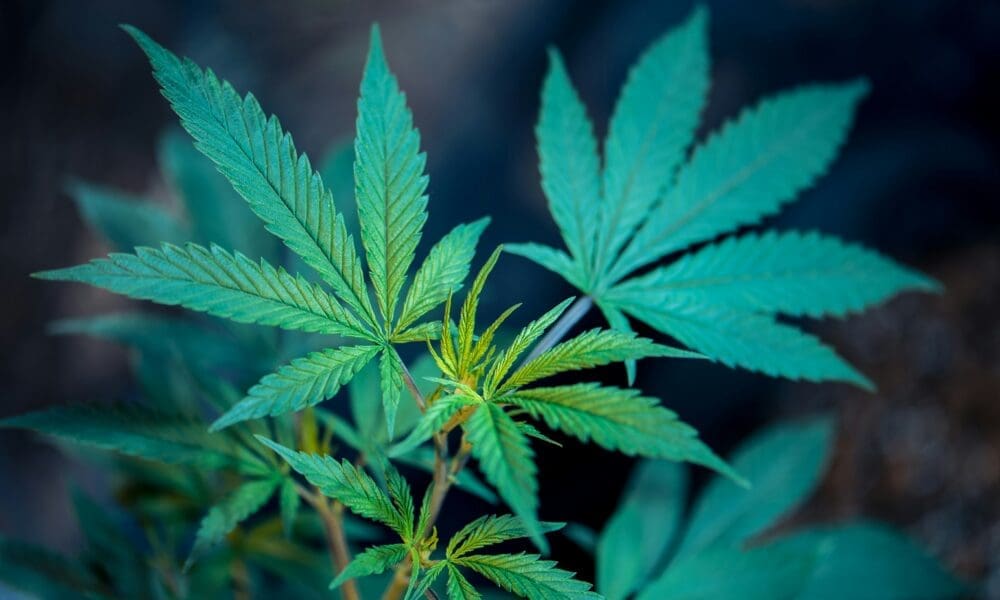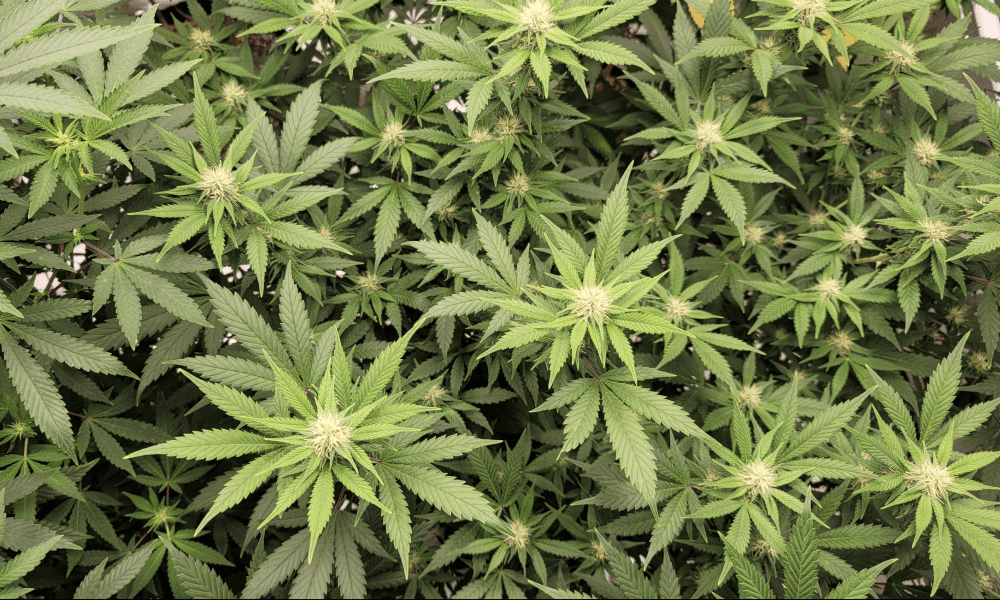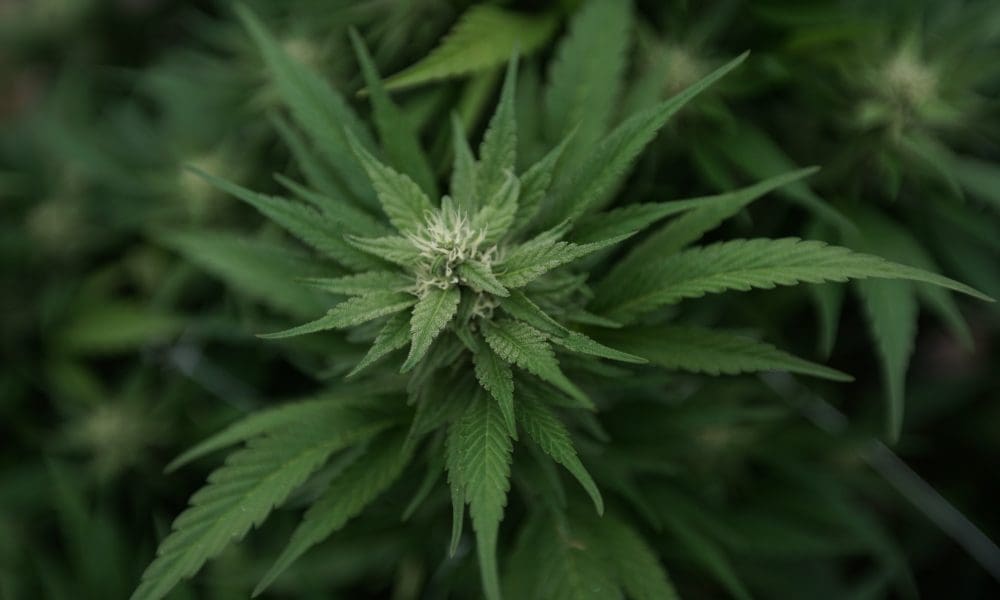featured
Marijuana Use Has A Positive Impact On Consumers’ Careers, Poll Says
Published
1 day agoon

A majority of marijuana consumers say their use of cannabis has had a “positive” impact on their careers, according to a new poll.
The survey from the medical cannabis telehealth platform NuggMD posed the question: “Has cannabis use had a positive or negative effect on your job or career?”
Fifty-four percent of respondents said their marijuana consumption led to positive developments in their careers, including 28 percent who described it as “very positive.”
Just about 10 percent said using cannabis had a “negative” effect on their jobs, while 36 percent said it had no impact at all.
“Prohibitionists are still trying desperately to sell the fiction that access to cannabis causes workplace amotivation,” Andrew Graham, head of communications at NuggMD, told Marijuana Moment. “Since they all tend to read from the same tired playbook, it would not surprise me if the inverse of that accusation were what’s actually true.”

Via NuggMD.
“That’s not exactly what the polling data here says, but that’s the direction it’s pointing,” he said. “Wellness-focused employers need to get smarter about how today’s workforce uses cannabis, because there’s mounting evidence in favor of taking it seriously as a potential workplace benefit.”
The poll involved interviews with 493 marijuana consumers from July 3-20, with a 4.4 percentage point margin of error.
While the survey itself is a subjective assessment about individual cannabis users’ career experience, it further disrupts the prohibitionist narrative about the potential harms of legalization for the workforce.
Several other studies have touched on the issue in different ways.
For example, in 2021 a partially federally funded study found that adult-use legalization is associated with an increase in workforce productivity and decrease in workplace injuries.
In 2023, researchers involved in a separate study found that workers who use marijuana off the clock are no more likely to experience workplace injuries compared to those who don’t consume cannabis at all, challenging “overly broad” zero-tolerance employment policies.
A more recent study on marijuana legalization’s effect on workers’ compensation found that while the policy change is associated with a “gradual increase” in workers’ comp claims, the average cost per claim in fact fell after the policy change—as did patient use of prescription drugs, especially opioids and other painkillers.
Separately, an analysis last year of five years’ worth of federal health survey data by researchers at the Centers for Disease Control and Prevention (CDC) found that employees in the food service and hospitality industries were some of the most common consumers of marijuana among U.S. workers.
People in arts, design, entertainment, sports and media occupations also reported comparatively high rates of past-month cannabis use, as did workers in construction and extraction. Among those least likely to report marijuana use, meanwhile, were law enforcement, health care providers and workers in libraries and education.
Photo courtesy of Martin Alonso.

Author: mscannabiz.com
MScannaBIZ for all you Mississippi Cannabis News and Information.
You may like
-


Broader Launch Of Minnesota’s Marijuana Retail Market Is Almost Here, State Officials Say
-


Bipartisan Coalition Of 32 Attorneys General Pushes Congress To Urgently Pass Marijuana Banking Bill
-


Marijuana And CBD Provide ‘Significant Symptom Relief’ For Inflammatory Bowel Disease Patients, Federally Funded Study Finds
-


Doctor Who Allegedly Said ‘I Wonder How Much This Moron Will Pay’ Pleads Guilty
-


Killing reported at Oklahoma marijuana grow operation
-


Texas Voters Want Synthetic THC Outlawed, Poll Shared By Proponents Of Reining In Hemp Industry Finds
featured
Broader Launch Of Minnesota’s Marijuana Retail Market Is Almost Here, State Officials Say
Published
1 hour agoon
July 26, 2025
“I don’t think it was anticipated that the tribal program and operations would start so far ahead of non-tribal licenses.”
By Matthew Blake, MinnPost
Amid the coffeeshops and cocktail lounges that dot the intersection of West 25th Street and South Lyndale Avenue in Minneapolis sits the Loon Smoke Shop, where amiable loiterers congregate late into the evening vaping or smoking.
You might soon find a scene like this a few blocks south at the smoke shop’s new dispensary, which is in the final steps of the state cannabis licensing process and is hiring people “passionate” about the marijuana industry.
“We’re currently looking for budtenders, lead budtenders and store managers,” an Instagram post read.
When Gov. Tim Walz (DFL) signed legislation legalizing cannabis in 2023, there was a retail target that stores across the state would open by 2025 at the latest.
As MinnPost has diligently chronicled, that hasn’t happened. Asked last week which of the DFL-controlled Legislature’s myriad laws passed in 2023 is most difficult to implement, Gov. Walz was quick to say legal weed.
That might be changing.
In the last month, the Minnesota Office of Cannabis Management (OCM) has granted final approval to five retailers to begin selling cannabis, the first such businesses not operated by one of the state’s 11 tribal nations.
By the end of the year Minnesota could see up to 150 marijuana businesses not owned by the tribes, according to Eric Taubel, interim director of the Office of Cannabis Management.
Taubel said in an interview that if a cannabis shop is slow to get off the ground, the weed entrepreneur can no longer blame a cumbersome state licensing process.
“We’ve transitioned to the point where the onus is on the applicant and a prospective business owner,” Taubel said.
Here is an assessment of where Minnesota is in legalizing it.
I want legal marijuana now. Where can I buy it in Minnesota?
Except for drinks at bars and liquor stores infused with hemp-derived THC, the sale of marijuana is still confined to tribal operators.
Returning to Minnesota marijuana legalization 101, the state law permits tribes to determine how they want to oversee grow and sales operations.
“Minnesota is a national leader in its approach to cannabis and tribal nations,” Taubel said. “Gov. Walz and Lt. Gov. Flanagan have been leaders in what tribes can do and recognize their inherent sovereignty.”
As a result, Minnesotans can stop reading this article and drive right now to retailers on tribal lands. Stores have been open since August 2023 when the Red Lake Nation opened a dispensary.
The law also lets these tribes operate pot businesses outside reservation land if they agree to an overall regulatory compact with the Office of Cannabis Management. The first such compact was finalized in May with the White Earth Nation, which has since opened stores in St. Cloud and Moorhead.
“I don’t think any other state has a model like this,” said Leila Fatehi, a lawyer at Blunt Strategies, an aptly named Minneapolis-based law firm representing pot businesses. “I don’t think it was anticipated that the tribal program and operations would start so far ahead of non-tribal licenses.”
What about the five non-tribal licenses you mentioned?
The Office of Cannabis Management granted final approval in June for a company called Herb-Quest to operate a cultivation center in Pine County.
Then this week, Concentrate Labs, doing business as Roots and Resin Farm, got the state’s greenlight to open its own cultivation site in Chisago County.
And The Smoking Tree, Loon Lab Extracts and Research (not to be confused with Loon Dispensary), and Fairwater Farm nabbed licenses to sell pot in the cities of Albert Lea, Isanti and Plainview respectively.
These five businesses not only cleared state hurdles but also went through the county and city approval process, more or less.
Jacob Schlichter, founder of the Smoking Tree, told MinnPost that he must still get final permission at a July 28 Albert Lea City Council meeting. But Schlichter described this step as a formality. He fully expects to open his shop in the coming weeks.
What is this I’m seeing about cannabis state lotteries?
In June, 249 applicants won a lottery held by the Office of Cannabis Management, including the aforementioned Lyndale Avenue Loon dispensary.
Each winner qualified for social equity status, whose criteria can include veteran status, being a victim of the war on drugs, or coming from a high-poverty area.
On Tuesday, the office held a second lottery with 75 winners out of 569 applicants, a pool that included applicants who did not qualify for equity status.
But winning these lotteries is just one step in the path toward a state license. Though city and county governments are not legally permitted to reject a pot business, they can put forth requirements, such as a store being a certain distance away from a school.
“Each municipality handles zoning differently,” Taubel acknowledged. “The county and city may only meet every month.”
The Cannabis Management interim director described a “checker board” of additional steps, including submitting to a criminal background check (While the state wants to help victims of stern drug possession laws, they do not want to assist convicted white-collar criminals) and a labor agreement that affords employees rights in exchange for no pickets, boycotts or strikes at the cannabis business.
Once lottery winners jump through these hoops, they can apply with the state for final approval.
So why weren’t recreational cannabis stores opened by 2025 at the latest?
Walz attributed delays in part to shifting leadership at the Office of Cannabis Management. In January, one interim director, Charlene Briner, was replaced by another interim head, Taubel. And before Briner, there was a botched hire in 2023 that led to a review by the Office of the Legislative Auditor.
(Walz said of Taubel, “I think he’s done a fantastic job.” But the governor declined to say whether he will be named permanent director.)
The governor also said, “There really was not a model of how to do it,” adding that each of the 22 states preceding Minnesota in legalizing pot “have struggled to a certain degree.”
The model the state chose is also an unusual one.
“In Minnesota, the rollout has been a bit slower than in other states, which relied on incumbent medical marijuana dispensaries,” Fatehi said. “Minnesota created a framework to have a larger pool of applicants.”
That choice is now bearing fruit, Taubel said, as dozens of legal pot stores, many founded by entrepreneurs new to the industry, should come online by the end of the year.
One concern of some non-tribal businesses is that the tribes got too much of a headstart. Fatehi was skeptical of this line of thinking. But she did say early Minnesota retailers are likely to buy from tribal cultivators.
Another worry is that legal weed becomes too expensive. A state budget otherwise conspicuous in its absence of new revenue raised the cannabis tax from 10 percent to 15 percent.
Including state and local sales tax, customers will pay north of a 20 percent levy on each cannabis purchase.
“There is absolutely an enormous cause of concern that it is taxed too high,” Fatehi said.
Taubel defended the tax as “middle of the road” compared to other states. (It is a very long metaphorical road. Per the Tax Foundation, Connecticut has the lowest weed excise tax at 3 percent. Washington State sports the highest at 37 percent.)
“I’m a little suspect that the 5 percent increase will have substantial ripple effects,” Taubel said.
MinnPost reporter Brian Arola contributed to this story.
This article first appeared on MinnPost and is republished here under a Creative Commons Attribution-NoDerivatives 4.0 International License.![]()
Photo courtesy of Mike Latimer.

Author: mscannabiz.com
MScannaBIZ for all you Mississippi Cannabis News and Information.
featured
Bipartisan Coalition Of 32 Attorneys General Pushes Congress To Urgently Pass Marijuana Banking Bill
Published
9 hours agoon
July 26, 2025
A bipartisan coalition of 32 state and territory attorneys general from across the U.S. are calling on Congress to pass a marijuana banking bill to free up financial services access for licensed cannabis businesses.
In a letter sent to House and Senate leaders on Thursday— led by the attorneys general from Washington, D.C., Georgia, Maryland and Ohio—the officials said they want to see the Secure and Fair Enforcement Regulation (SAFER) Banking Act taken up this session.
“We are a bipartisan group of state and territorial attorneys general who, like you, have a strong interest in protecting the physical and economic wellbeing of our constituents while enabling economic growth and stability in our respective states,” the letter says. “We therefore urge Congress to advance this legislation, which will increase access to regulated banking and financial services for state-regulated cannabis businesses in jurisdictions that have legalized these businesses.”
“It is increasingly critical to move cannabis commerce into the regulated banking system. The majority of states and several territories have legalized some use of cannabis,” it says. “As more states continue to consider and implement legalization efforts, the lack of access to America’s financial system by cannabis businesses—which is a direct result of federal banking law—presents a considerable safety issue for the public.”
The officials stressed that, under current federal policy, many marijuana businesses are forced to operate on a largely cash-only basis, making them targets for crime and putting employees and customers “at greater risk.”
“Allowing access to the nation’s regulated banking system is crucial to public safety and to ensuring that lawful businesses in our states have access to regulated banking services,” they wrote.
Today I joined a bipartisan coalition urging Congress to pass the SAFER Banking Act. Legal cannabis businesses in states like Maryland are forced to operate in cash because of outdated federal rules—putting workers at risk and making it harder to collect taxes and enforce the… pic.twitter.com/n2YPAGIcnQ
— Anthony G. Brown (@OAGMaryland) July 24, 2025
The letter also states that the current lack of banking access for the cannabis industry makes tax collection and oversight more challenging, and the SAFER Banking Act “would help ensure that state governments do not forfeit hundreds of millions of dollars in tax revenue that the cannabis industry generates.”
However, despite the attorneys general saying at the top of the letter that they’re voicing support for the “SAFER Banking Act of 2025,” the bill has not yet been reintroduced this session, so it’s unclear whether any provisions might be changed from the prior version that died at the end of the last Congress.
“To address these challenges, we request that Congress advance the SAFER Banking Act or similar legislation. Congress should provide a safe harbor for depository institutions that provide a financial product or service to a covered business in a state that has implemented laws and regulation that ensure accountability in the cannabis industry. An effective safe harbor would bring billions of dollars into the banking sector, enabling law enforcement, federal, state, and local tax agencies, and cannabis regulators in the states and territories to more effectively monitor cannabis businesses and their transactions. Compliance with tax laws would be simpler and easier to enforce with the regulated tracking of funds in the banking system, resulting in higher tax revenues.”
“The SAFER Banking Act is common-sense, bipartisan, and will beneficially impact the safety of the nearly 75 percent of Americans who live in a state where cannabis has been legalized,” the letter concludes. “The bill respects both state sovereignty and the current status of cannabis at the federal level. It does not encourage legalization, nor does it facilitate cannabis sales in states that have chosen not to legalize it.”
“The SAFER Banking Act simply addresses the specific public policy challenges facing states in light of the federal prohibition on banking cannabis-related funds, and it does so in a way that will help move cash from legal cannabis businesses into the highly regulated banking system, where it will be more transparent to state regulators and law enforcement,” it says. “We look forward to working on this bipartisan issue with you.”
The other signatories on the letter are the attorneys general of Alaska, American Samoa, Arizona, California, Colorado, Connecticut, Delaware, Hawai’i, Illinois, Maine, Massachusetts, Michigan, Minnesota, Nevada, New Jersey, New Mexico, New York, Northern Mariana Islands, Oklahoma, Oregon, Pennsylvania, Rhode Island, South Dakota, U.S. Virgin Islands, Utah, Vermont, Washington and West Virginia.
“When legal cannabis businesses are forced to operate in cash, it’s not just inefficient–it’s dangerous,” Arizona Attorney General Kris Mayes (D) said in a press release. “The SAFER Banking Act is a practical solution that will protect workers and communities while ensuring Arizona can effectively collect taxes and oversee this growing industry.”
Michigan Attorney General Dana Nessel (D) said that, “By reducing the risk of crime and improving tax compliance through access to regulated financial services, the SAFER Banking Act has the ability to enhance both public safety and transparency.”
“With billions in revenue, giving cannabis businesses a secure place to bank isn’t just smart policy—it’s common sense,” she said.
Colorado Attorney General Phil Weiser (D), meanwhile, said he’s “been urging Congress to allow cannabis companies to access the commercial banking system for years because of the safety risks many cannabis companies take on simply to do business.”
Attorney General Phil Weiser today joined a bipartisan coalition of attorneys general in calling on Congress to pass legislation which would provide legal clarity for banks and financial institutions to serve state-regulated cannabis businesses. Read more: https://t.co/Umb0v9hW8L pic.twitter.com/7gVfEDZrcB
— Colorado Attorney General (@COAttnyGeneral) July 25, 2025
“This commonsense reform will also make it easier for Colorado to oversee the industry, better protecting consumers, public safety, and public health,” he said.
Meanwhile, the Democratic Senate sponsor of the marijuana banking bill recently said that, despite efforts to coordinate meetings around the legislation, other priorities have taken precedence for now.
Asked about recent comments Sen. Bernie Moreno (R-OH)—the lead GOP sponsor of the SAFER Banking Act this session who told Marijuana Moment that he doesn’t expect the bill to come up until this fall—Sen. Jeff Merkley (D-OR) said, “Hopefully sooner than later in my mind.”
In January, the office of Rep. Dave Joyce (R-OH), who is again leading the effort on the House said, told Marijuana Moment that he would be filing the cannabis banking legislation this session but that its introduction was “not imminent” as some earlier reports had suggested.
A leading anti-marijuana group recently sounded the alarm about a possible attempt to put the cannabis banking measure in a cryptocurrency bill that was advancing on the Senate floor, but that didn’t come to fruition.
With Republicans in control of both chambers and key leadership positions filled by opponents of marijuana legalization, it’s been an open question about whether any cannabis reform legislation stands a chance of passage in the short-term. That’s despite the fact that President Donald Trump endorsed marijuana industry banking access, federal rescheduling and a Florida legalization initiative on the campaign trail. However, he’s been silent on the issue since taking office.
On the House side, a Republican lawmaker said in March he’s hopeful that Congress will be able to get a marijuana banking bill across “the finish line” this session, arguing that the current barriers to financial services for the industry represent a “second tier” of prohibition.
Cannabis industry banking challenges came up in several congressional hearings in March, including a Senate Banking Committee meeting on debanking where senators on both sides of the aisle addressed the lack of financial services access for marijuana businesses.
Meanwhile, in January congressional researchers released a report detailing the subject of debanking—while making a point to address how the marijuana industry’s financial services access problem “sits at the nexus” of a state-federal policy conflict that complicates the debate.
Separately, the Government Accountability Office (GAO) announced in December that it’s convening focus groups comprised of marijuana businesses to better understand their experiences with access to banking services under federal prohibition.
—
Marijuana Moment is tracking hundreds of cannabis, psychedelics and drug policy bills in state legislatures and Congress this year. Patreon supporters pledging at least $25/month get access to our interactive maps, charts and hearing calendar so they don’t miss any developments.![]()
Learn more about our marijuana bill tracker and become a supporter on Patreon to get access.
—
The industry remains frustrated with the lack of progress on the cannabis banking issue under the last administration.
A Senate source told Marijuana Moment in December that Republican House and Senate leadership “openly and solely blocked” then-Senate Majority Leader Chuck Schumer’s (D-NY) attempt to include the bill in a government funding bill as the session came to a close.
Sens. Elizabeth Warren (D-MA) and Tommy Tuberville (R-AL) had challenged the idea that there was enough GOP support for the SAFER Banking Act to pass on the Senate floor during the lame duck session.
Warren accused certain Republican members of overstating support for the legislation within their caucus, while also taking a hit at Trump for doing “nothing” on cannabis reform during his time in office as he makes a policy pivot ahead of the election by coming out in support of the marijuana banking bill and federal rescheduling.
Sen. John Hickenlooper (D-CO) also recently argued in an interview with Marijuana Moment that the main barrier to getting the marijuana banking bill across the finish line is a lack of sufficient Republican support in the chamber. And he said if Trump is serious about seeing the reform he recently endorsed enacted, he needs to “bring us some Republican senators.”
Prior to becoming House speaker, Rep. Mike Johnson (R-LA) consistently opposed cannabis reform, including on incremental issues like cannabis banking and making it easier to conduct scientific research on the plant.
Meanwhile, on the one-year anniversary of a Senate committee’s passage of the SAFER Banking Act in September, the Congressional Budget Office (CBO) released an analysis on the economic impact of the reform, including the likely increase in federally insured deposits from cannabis businesses by billions of dollars once banks receive protections for servicing the industry.
Separately, the CEO of the financial giant JPMorgan Chase said recently that the company “probably would” start providing banking services to marijuana businesses if federal law changed to permit it.

Author: mscannabiz.com
MScannaBIZ for all you Mississippi Cannabis News and Information.
featured
Marijuana And CBD Provide ‘Significant Symptom Relief’ For Inflammatory Bowel Disease Patients, Federally Funded Study Finds
Published
10 hours agoon
July 25, 2025
A majority of patients with inflammatory bowel disease (IBD) said they felt marijuana and CBD were “beneficial” and provided “significant symptom relief” from their disorder, according to a new federally funded survey-based study.
With support from the National Institutes of Health (NIH), researchers at Case Western Reserve University conducted a survey of IBD patients, inquiring about different treatment options they feel could effectively address the pain and other symptoms associated with their condition.
More than 50 percent of participants who reported using cannabis said they feel it’s an effective therapeutic option, offering “relief from abdominal pain, other pain, stress, anxiety, depression, and nausea/vomiting.”
“The strong support of cannabis and CBD oil as medical treatments and therapeutic effects highlights the potential for cannabis and CBD oil as treatments in IBD,” the study authors said. “Notably, 19.4 percent of IBD patients reported decreased opioid use, and 14.5 percent reported induced remission with cannabis or CBD oil,” the study says.
“The beliefs on the efficacy of cannabis and CBD oil are comparable to that of prescribed medications (e.g., corticosteroids and biologics/immunosuppressants), suggesting that cannabis may be perceived as equally effective. These results show that there exists a strong belief that these substances could be favorable to various IBD symptom relief, including abdominal pain, diarrhea, anxiety, and inflammation.”
The researchers noted that a significant portion of respondents with IBD self-reported using cannabis (54 percent) or CBD (41 percent) for “medical use, symptom relief, pain management, and mental health support.”
“A large proportion, 63 percent, of IBD participants reported that cannabis had a somewhat, very, or extremely beneficial effect in relieving their IBD symptoms, while 57 percent held this belief about CBD oil,” it says.
“Interestingly, we found that IBD patients were more likely to have used cannabis or CBD oil for short-term symptom relief (37 percent and 26 percent, respectively) compared to long-term symptom relief (23 percent and 18 percent, respectively). Such a pattern indicates that, among IBD patients, these substances are considered to be more effective in the management of acute symptoms rather than in the long-term management of the disease.”
The survey-based cross-sectional study involved 139 participants, including 106 IBD patients and 39 non-IBD controls between the ages of 18 and 69.
The authors concluded that the study demonstrated “increasing interest and positive perceptions by IBD patients toward the use of cannabis and CBD oil as complementary or alternative therapies for symptom management.”
It also “highlights the common perception among IBD patients that cannabis and CBD oil are effective therapeutic agents for symptom management, in spite of the lack of conclusive clinical evidence.”
“The findings indicate that a significant proportion of IBD patients use cannabis, notice symptom relief, and prefer its therapeutic use,” the study says.
The results comport with a scientific review of research on the impacts of marijuana on inflammatory bowel diseases such as Crohn’s disease (CD) and ulcerative colitis (UC) that was released last year, finding that cannabinoid therapy helped reduce disease activity and improved quality of life in patients with the chronic diseases.
In March of last year, a separate study in the Journal of Health Research and Medical Science found that “cannabinoids show potential in improving disease activity” and quality of life in patients with ulcerative colitis.

Author: mscannabiz.com
MScannaBIZ for all you Mississippi Cannabis News and Information.

Broader Launch Of Minnesota’s Marijuana Retail Market Is Almost Here, State Officials Say

Bipartisan Coalition Of 32 Attorneys General Pushes Congress To Urgently Pass Marijuana Banking Bill

Marijuana And CBD Provide ‘Significant Symptom Relief’ For Inflammatory Bowel Disease Patients, Federally Funded Study Finds

Doctor Who Allegedly Said ‘I Wonder How Much This Moron Will Pay’ Pleads Guilty

Killing reported at Oklahoma marijuana grow operation

Texas Voters Want Synthetic THC Outlawed, Poll Shared By Proponents Of Reining In Hemp Industry Finds

Judge rejects No Savage’s rap culture argument – NBC4 Washington

California Moves to Ban Hemp Wellness Products — And the Weed Nuns Are Fighting Back

Cannabis & Psychedelics Reported Most Effective Non-Prescription Drugs by Eating Disorder Patients

Kentucky Governor Urges Trump To Oppose Bill Blocking Marijuana Rescheduling That’s Advancing In Congress

New York cannabis board approves 52 new licenses, pushes total to 1,851

South Park Loves Marijuana – The Fresh Toast

Lo Más Reciente de High Times en Español

DEA Judge Overseeing Cannabis Rescheduling Process Retires

GOP Senator Threatens To Block Spending Bill If Hemp THC Product Ban Stays In, Sources Say

The Best Delicious Summer Cocktails

The Race to Nowhere: How Chasing Potency Undermines Cannabis Quality (Opinion)

Weed & Psychedelics Are Doing for Eating Disorders What Big Pharma Couldn’t, Survey Says

Congressional Committee Pushes To ‘Eliminate’ Illegal Marijuana Grows And Tackle Money Laundering By Chinese-Linked Cannabis Operations

Supreme Court Will Discuss Ban On Marijuana Users’ Gun Ownership In September

Watch: £1m cannabis factory found in town’s old Woolworths store | News

Texas cannabis legalization bill filed in hemp-focused special session (Newsletter: July 25, 2025)

Mississippi AG takes aim at hemp products, including Delta THC | State

Judge overseeing cannabis rescheduling retires, leaving it to Trump’s DEA head (Newsletter: July 24, 2025)

Alert: Department of Cannabis Control updates data dashboards with full data for 2023

Connecticut Appoints The US’s First Cannabis Ombudsperson – Yes there is a pun in there and I’m Sure Erin Kirk Is Going To Hear It More Than Once!

5 best CBD creams of 2024 by Leafly

EU initiative begins bid to open access to psychedelic therapies

Free delta-9 gummies from Bay Smokes
New Study Analyzes the Effects of THCV, CBD on Weight Loss

5 best autoflower seed banks of 2024 by Leafly

May 2024 Leafly HighLight: Pink Runtz strain

Curaleaf Start Process Of Getting Their Claws Into The UK’s National Health System – With Former MP (Resigned Today 30/5/24) As The Front Man

Mississippi city official pleads guilty to selling fake CBD products

Discover New York’s dankest cannabis brands [September 2024]

Horn Lake denies cannabis dispensary request to allow sale of drug paraphernalia and Sunday sales | News

Local medical cannabis dispensary reacts to MSDH pulling Rapid Analytics License – WLBT

Press Release: CANNRA Calls for Farm Bill to Clarify Existing State Authority to Regulate Hemp Products

Nevada CCB to Accept Applications for Cannabis Establishments in White Pine County – “Only one cultivation and one production license will be awarded in White Pine County”

5 best THC drinks of 2024 by Leafly

The Daily Hit: October 2, 2024

6 best CBD gummies of 2024 by Leafly

5 best delta-9 THC gummies of 2024 by Leafly

Weekly Update: Monday, May 13, 2024 including, New Guide for Renewals & May Board meeting application deadline

People In This State Googled ‘Medical Marijuana’ The Most, Study Shows

PRESS RELEASE : Justice Department Submits Proposed Regulation to Reschedule Marijuana

Thailand: Pro-cannabis advocates rally ahead of the government’s plan to recriminalize the plant

Press Release: May 9, STIIIZY and Healing Urban Barrios hosted an Expungement Clinic & Second Chance Resource Fair
Trending
-

 California Cannabis Updates1 year ago
California Cannabis Updates1 year agoAlert: Department of Cannabis Control updates data dashboards with full data for 2023
-

 Breaking News1 year ago
Breaking News1 year agoConnecticut Appoints The US’s First Cannabis Ombudsperson – Yes there is a pun in there and I’m Sure Erin Kirk Is Going To Hear It More Than Once!
-

 best list12 months ago
best list12 months ago5 best CBD creams of 2024 by Leafly
-

 Business10 months ago
Business10 months agoEU initiative begins bid to open access to psychedelic therapies
-

 Bay Smokes1 year ago
Bay Smokes1 year agoFree delta-9 gummies from Bay Smokes
-

 cbd1 year ago
cbd1 year agoNew Study Analyzes the Effects of THCV, CBD on Weight Loss
-

 autoflower seeds10 months ago
autoflower seeds10 months ago5 best autoflower seed banks of 2024 by Leafly
-

 California1 year ago
California1 year agoMay 2024 Leafly HighLight: Pink Runtz strain

